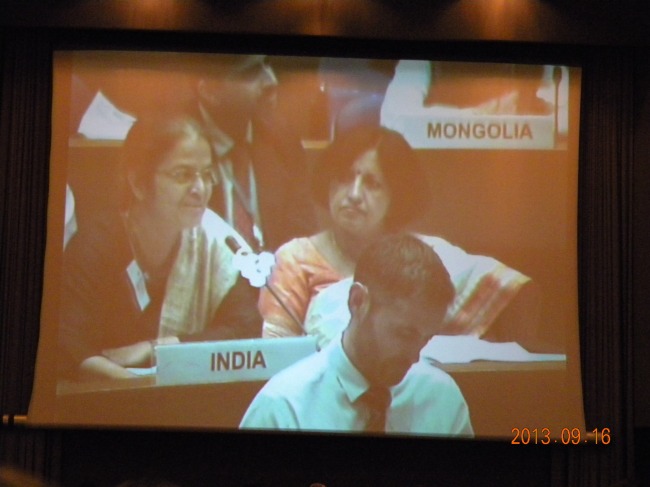It was the first day of the senior officials meeting at the 6th Asian and pacific Population Conference at Bangkok. The day one itself was extremely exciting and full of hot global politics with regards to the issues of sexuality, comprehensive sexual education and gender identities, and other issues.
Countries were clearly divided and battle plans were already ready! Block politics were very clear and evident when the country delegates raised contentions and reservations to certain sections of the outcome document of this monumental meeting. Clearly, letting go of control over women and broadening the horizon of civil rights to protecting diverse sexual identities, saw strong reservations from countries like Russia, Pakistan and Iran in the room. Food security and nutrition emerged as one among the pressing global challenges.
The chair (Mr keshav Desiraju, presiding over the UN conference) played a graceful and key role and in facts set in motion discussions between delegates to negotiate controversial concerns among themselves and come to an agreed consensus, while not dropping the rights language of the outcome document.
Civil society meeting to prepare for the UN ESCAP and rendezvous with delegates
As the 120 civil society organisations from Asia and Pacific had anticipated in the two day intensive strategic meetings just before the UN ESCAP, strong reservations to language of ‘rights based approach’ were raised by Iran and Russia. Professor Gita Sen joined the ESCAP and boldly spoke the language of rights. She took charge of strengthening the language around rights and proposed alternatively strong language at points when countries opposed to rights based approaches. She said and I quote “recognizing the need to enact and implement policies and programmes on adolescent health, reproductive health and child health that fully respects Human Rights and further recognize the need for countries to learn from each other on approaches towards achieving universally health care including universal health coverage”.
India hooted that Violence Against Women derives centrally from particularly some aspects of culture. India rephrased the Preamble point number 34 of the outcome document (which will be submitted to the 70th session in April to commission of population in New York and General Assembly Special Session on the follow-up to the Programme of Action of the International Conference on Population and Development in 2014) into a stronger language as “recognizing that while also recognizing that violence against women throughout the lifecycle derives essentially from harmful cultural patterns, in particular the effects of certain traditional or customary practices and all acts of extremisms linked to race, language or religion that perpetuate the lower status accorded to women in the family, workplace, the community and society” this was supported by Pakistan, Japan, Philippines, Bhutan, Papua New Guinea, Cambodia) but opposed by Iran and Russia once again!!
India has managed to incorporate the recommendation that population policies based on incentives and disincentives should be replaced with rights-based policies into the combined civil society statement read out in the UN by the Indian CSO delegation.
Cheers!!
Leena Uppal, Coalition Against Two-Child Norm and Coercive Population Policies 
